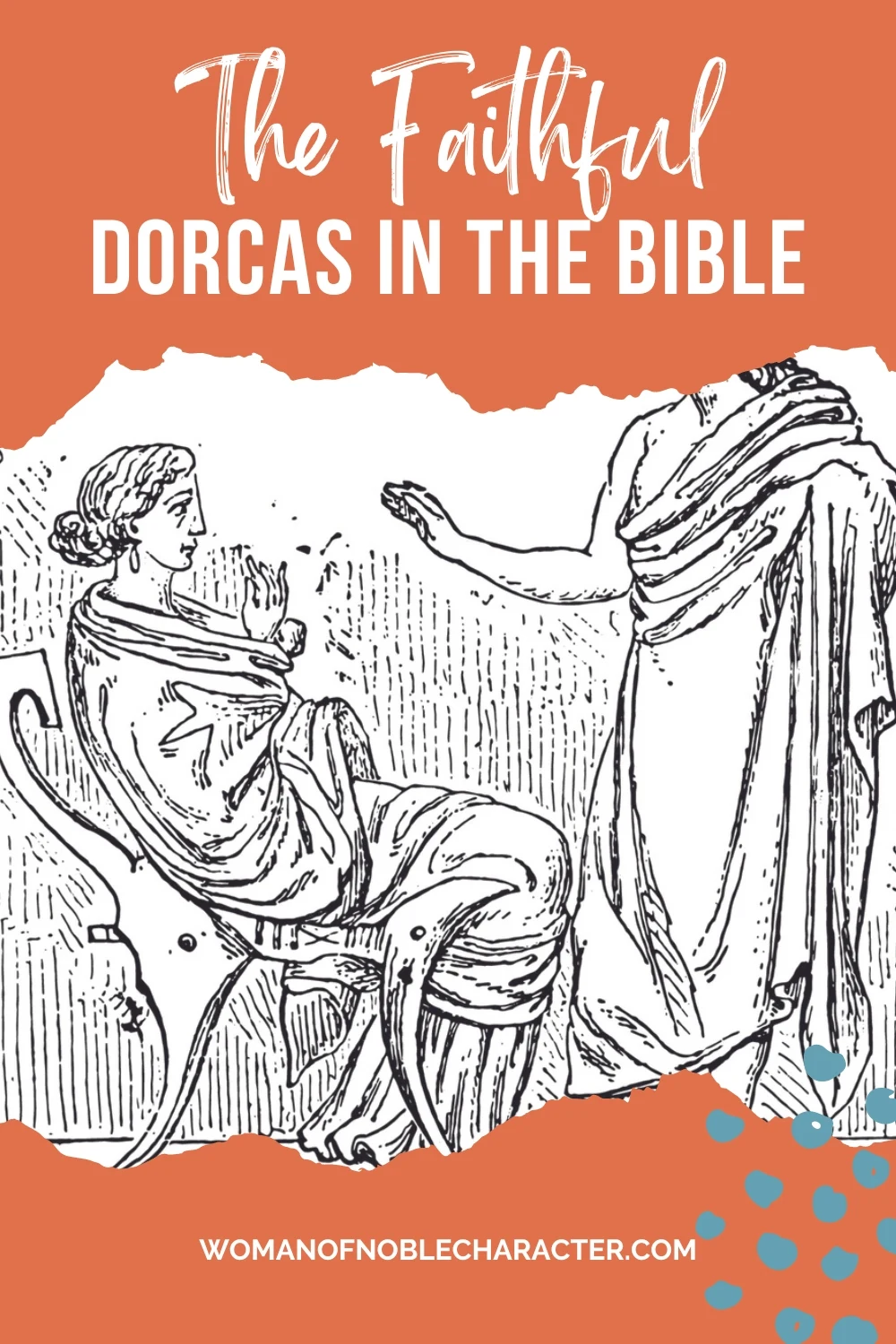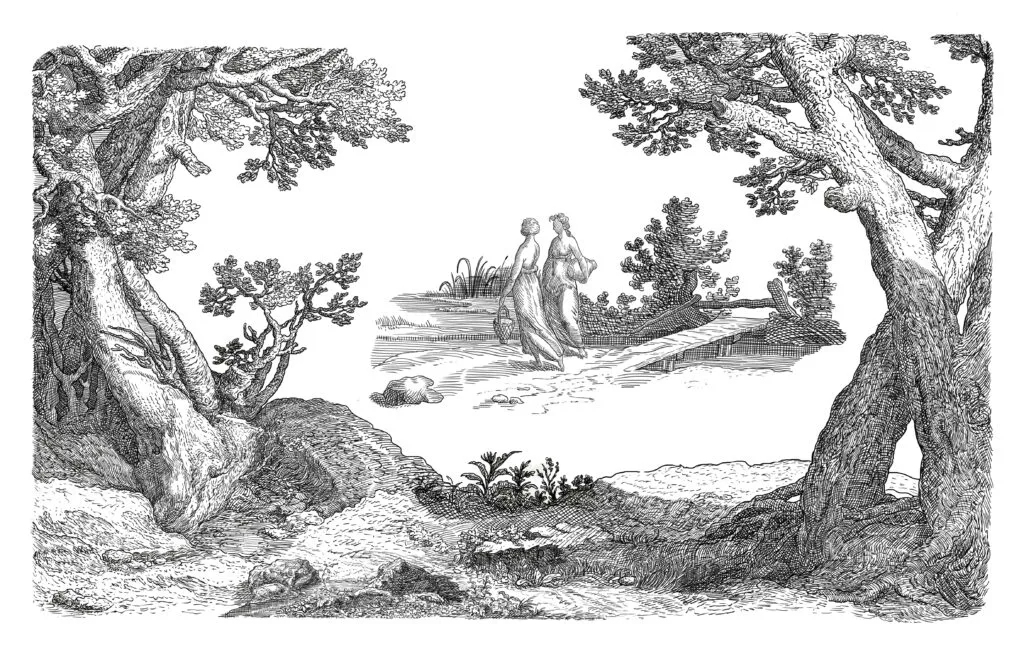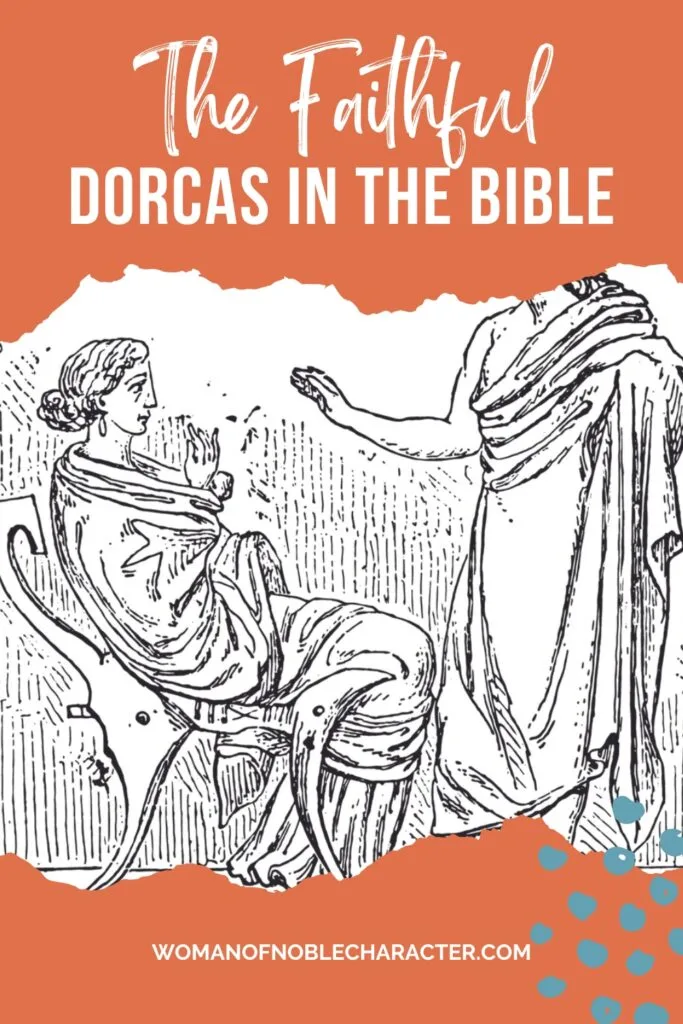This page/post may contain affiliate links. As an Amazon Associate, as well as an affiliate of other programs, this means if you purchase something using these links, I will receive a commission on qualifying purchases at no cost to you! For more detailed information, please visit our Affiliate Disclaimer page
Dorcas in the Bible
The story of Dorcas in the Bible is one of the most profound and inspiring ones you’ll read. In this story, we meet a faithful follower of Christ who served others in their time of need and who herself received God’s grace and mercy in her time of need.
This woman’s life and her gift of hospitality, charitable work, acts of kindness, and love for God and his people set her apart in the kingdom of God.
In this post, we will cover the story of Dorcas of Joppa as it’s told by Luke in Acts 9:36-42. There are many lessons we can take from her life that will help us grow spiritually.

The meaning of the name Dorcas
Dorcas’ Jewish or Hebrew name was Tabitha, and she was also known by her Greek name Dorcas. Both names mean a gazelle or deer. The name is of Aramaic origin, and the gazelle was a symbol of graceful beauty.
Where did Dorcas live?
She lived in Joppa, an important seaport for Jerusalem overlooking the Mediterranean Sea. It is about 35 miles northwest of Jerusalem and 10-12 miles northwest of the nearby town of Lydda.
Lydda and Joppa are both located in Judea. The city of Joppa is the modern-day Jaffa (also known as Yafo).
The story of Dorcas in the Bible
Dorcas is one of several devout women of the Bible who appear in the Book of Acts. There is also Priscilla, who we meet in Acts 18. She had a tent-making business with her husband Aquilla in Corinth. She was also a teacher of the Gospel and part of Apostle Paul’s missionary team.
Then we have Lydia, who became the first convert to Christianity in Europe and was baptized at Philippi. She used her resources to support Paul’s ministry. In the Book of Acts, we also learn about Mark’s mother Mary, who offered her home for church services and prayers.
The form you have selected does not exist.
When we are introduced to Dorcas, the first thing we learn is that she was a female disciple of Jesus Christ. The only time we see the feminine form of the word disciple in Greek being used in the New Testament is with Dorcas and hardly elsewhere.
As a disciple, she was a believer and follower of Christ. She applied the teachings of Christ in her life. The disciples of Jesus were in the inner circle of the early church.
We learn that Dorcas was continually busy with charitable work for the needy and marginalized around her. She was a seamstress known for her good work of making clothes for the widows in her community. She made a difference to those around her in practical ways.
When she fell sick and died, the people washed Tabitha’s body in preparation for burial as per the common custom. Then they put the dead body in the upper room. That’s when the people realized that they should send Peter, who was in nearby Lydda, to come and see them.
Just before we hear about Dorcas, we read a few verses earlier in Acts 9:32-35 how Paul had healed a man named Aeneas in the neighboring town of Lydda. So these people had heard about this miracle and were expecting the same for Dorcas.
When they brought Apostle Peter to the upstairs room of Tabitha’s home, he found all the widows stricken with grief and mourning for Dorcas. They showed him all the tunics and robes Dorcas used to make for them.
The death and resurrection of Dorcas
Peter went to the upper room where Dorcas’s body lay. He sent everyone out of the room, and then Peter knelt and prayed to God.
But Peter put them all out and knelt and prayed. And turning to the body he said, “Tabitha, arise.” And she opened her eyes, and when she saw Peter, she sat up. 41 Then he gave her his hand and lifted her up; and when he had called the saints and widows, he presented her alive. And it became known throughout all Joppa, and many believed on the Lord
Acts 9:40-42 NKJV
Lessons from the Story of Dorcas in the Bible
Dorcas is one of the most inspiring women we meet in the New Testament. While not much was written about her, this woman’s life made a huge impact. In these few scriptures, we learn quite a few important lessons we can apply to our lives today.
- Faith without good works is dead
The story of Tabitha teaches us that as disciples of Jesus, we not only need to talk about our faith but show good works as well. As we are compassionate and assist those around us in practical ways, others will believe in God and receive salvation as well.
Christ Jesus fulfilled both physical and spiritual needs in his ministry. When he fed the 5000 men, women, and children he had already preached the Gospel to them and healed sick people. Then, he gave them food when they were hungry. We are also a reflection of Christ and should do what he did.
and one of you says to them, “Go in peace, be warmed and filled,” without giving them the things needed for the body, what good is that? So also faith by itself, if it does not have works, is dead.
But someone will say, “You have faith and I have works.” Show me your faith apart from your works, and I will show you my faith by my works.
James 2:16-18 ESV
- Dorcas used her talents for God
Dorcas used her skills and talent for God. As a Christian woman and seamstress, she gave of herself, her time, and her resources to help the needy widows around her.
Because of her gift of hospitality, when the widows learned that she was dead, they gathered to mourn her. She was well-known, valued, loved, and respected.
- God cares for the vulnerable
She was an instrument of love in practical ways as she cared for the needy and she gave generously and kindly to them. The word of God says he cares for the vulnerable such as widows, children, and orphans, and we should do the same.
When we care for what God cares for, he will honor and reward our charitable deeds.
A father of the fatherless and a judge and protector of the widows,
Is God in His holy habitation.
Psalm 68:5 AMP
Honor and help those widows who are truly widowed [alone, and without support].
1 Timothy 5:3 AMP
- Peter relied on God’s power
Peter knelt to pray to show his humility and reliability on the Lord’s power in raising Dorcas from the dead. He learned from Jesus Christ the importance of praying and calling upon God’s presence and power to change situations.
When we go through challenging situations, God wants us to humble ourselves and call on the name of the lord to be our help, refuge, and strength.
- In God, there is always hope
Faced with a dead woman in that upper chamber, the people could have lost all hope. But once they knew that Apostle Peter had performed a miracle close by, they decided that all hope was not lost. And God showed up indeed in this situation.
The widows around Dorcas waited expectantly for Peter to change the situation they found themselves in. As we’re waiting on God to perform miracles in our lives, our hearts should be expectant.
- Leave a legacy in the kingdom of God
The Lord wants us to remember that even in our different roles in the home and church, we are not called to live for ourselves but for others.
Dorcas of Joppa dedicated her life to helping needy widows. Her acts of mercy and deeds of kindness showed in that many people mourned her.
Her faith and charitable deeds left a legacy. Even today, the good things we do and how we treat those around us should leave a legacy in God’s kingdom. In honor of the impact and legacy left by Dorcas, there have been several Dorcas societies opened around the world.
These help widows and the vulnerable in society. This Dorcas Society does charity work in Africa and other parts of the World. The Dorcas Organization creates societal structures and sustainable change for marginalized people in Eastern Europe, the Middle East, and Africa.
Now Dorcas could not have known at the time how much impact she would have. As a Christian woman and faithful disciple of Jesus Christ, your good works will influence generations to come. Even when you think you’re doing little things, these may be the most life-changing things.
God isn’t calling the qualified, but he qualifies the called. Even Apostle Peter was once just a fisherman, yet here he was performing miracles in God’s name. That’s the power of the God we worship.

In the hands of an all-powerful God, our talents can change the world. Dorcas had the gift of hospitality, and that left a mark for generations to come.
- God has a purpose for everything
Often time as believers, we struggle to see God’s purpose in suffering. But even a dead person can serve a mighty purpose. Tabitha’s resurrection bought many to believe in Christ Jesus in the town of Joppa. It was a testimony of God’s glory and power.
The word of God says in Romans 8:28, God works everything out for our good. He is the King of kings, and all honor, majesty, and glory belong to him.
The form you have selected does not exist.
A similar story of resurrection in the New Testament
Tabitha’s story is similar to the one when Jesus raised Jairus’ daughter from the dead. This scripture reference can be found in Mark 5:22-24 and Mark 5:35-32.
In both stories, we see a word being sent to the person society believes will raise the dead person. When Jesus arrived people were crying around Jairus’s daughter, and similarly, this is what happens when Apostle Peter arrived in the upstairs room where the body of Tabitha lay.
Both asked the crowd to leave them alone with the dead body to allow the Holy Spirit to work.
Similarly, both Christ Jesus and Peter commanded with authority for the dead person to rise. Jesus had said:
“Taking her by the hand he said to her, “Talitha cumi,” which means, “Little girl, I say to you, arise.” (Mark 5:41)
Peter also said: “Tabitha, get up” (Acts 9:40).
Both also came out with the resurrected person to the crowd.
When Jesus went to Jairus’ house he did not allow all the twelve disciples to go with him. He only took Peter, John, and James. So, Peter had a first-hand experience of this miracle, and we see him raising Dorcas in the same way.
The God of miracles is still working within us today through the Holy Spirit. We are inspired by the story of Tabitha to believe that we can turn hopeless situations into hopeful ones.
As women, we must never look down on ourselves. In the kingdom of God, he is looking for faithful women with skills and talents that they are willing to use for His glory and purpose.
The Lord sees the good deeds we do for others and will reward us. Ultimately, when we have both faith and good works it shows that we are true disciples of Jesus.
You may enjoy this brief video HIDDEN TEACHINGS of the Bible | Dorcas Knew What Many Didn’t Know
ESV – “Scripture quotations are from The ESV® Bible (The Holy Bible, English Standard Version®), copyright © 2001 by Crossway, a publishing ministry of Good News Publishers. Used by permission. All rights reserved.”
NKJV – Scripture taken from the New King James Version®. Copyright © 1982 by Thomas Nelson. Used by permission. All rights reserved.

